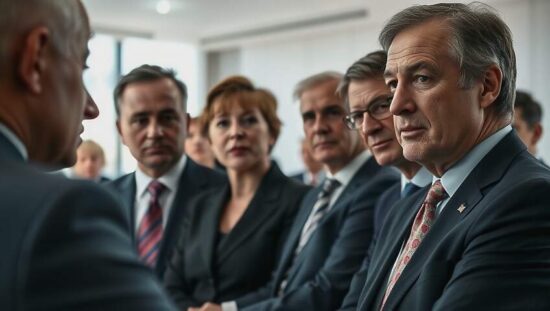Following internal discussions, members of the Alternative for Germany (AfD) parliamentary group have agreed to a shift in conduct and presentation during the current legislative period. According to reports in the “Frankfurter Allgemeine Sonntagszeitung” the decision, spearheaded by the parliamentary group’s executive board, aims for a more measured, serious and elevated approach from AfD representatives.
The move is reportedly driven by a desire to eventually secure a coalition government with another political party. AfD leader Tino Chrupalla explained that a less confrontational style could enhance the impact of parliamentary speeches and that a professional image is crucial for governance, demanding the projection of competence and a departure from what he termed a less refined demeanor.
Deputy party leader Kay Gottschalk emphasized the necessity of reaching out and engaging in constructive dialogue to secure a potential coalition partner, acknowledging that a majority cannot be achieved alone. Fellow deputy parliamentary group leader Sebastian Münzenmaier stressed the importance of maintaining civility and avoiding personal attacks, asserting that respectability is essential for being taken seriously.
Lawmaker Rüdiger Lucassen confirmed a commitment to toning down confrontational tactics and avoiding escalations within the parliamentary setting. Even Maximilian Krah, an AfD representative who recently distanced himself from certain ideological positions, indicated a need to represent a broader range of perspectives, citing his strong electoral performance.
The shift follows past instances of conduct deemed inappropriate, including a speech by Stephan Brandner that utilized controversial language and an online meme shared by Nicole Höchst which was internally criticized as lacking in decorum. The party is also reportedly attempting to moderate reactions during parliamentary proceedings, such as observing more restrained responses to government statements and the lack of celebratory displays following certain electoral outcomes.
This change in strategy is, in part, attributed to a significant increase in party membership. The AfD’s membership has nearly doubled since September 2023, now standing at approximately 64,000. Deputy party leader Gottschalk characterized a discernible evolution within the party’s base, moving away from a less professional image towards a composition including professionals and experienced advisors. Baden-Württemberg’s top candidate, Markus Frohnmaier, described this development as a “professionalization” of the party.
However, not all members of the AfD support the revised approach. Thuringia’s AfD leader Björn Höcke dismissed the strategy, arguing that moderation should be expected from established parties while his party maintains a crucial role as a dissenting voice.





